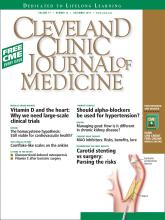ABSTRACT
Although evidence suggests that the homocysteine hypothesis is still relevant as a predictor of cardiovascular risk, we cannot conclude that measuring the homocysteine level is useful in guiding treatment. Furthermore, studies of primary and secondary prevention show no evidence that taking folic acid or other B vitamins lowers the risk of cardiovascular events.
- Copyright © 2010 The Cleveland Clinic Foundation. All Rights Reserved.
- Joellyn M. Abraham, MD and
- Leslie Cho, MD⇑
- Cardiovascular Medicine, Cleveland Clinic
- Section Head, Preventive Cardiology and Rehabilitation, and Director, Women’s Cardiovascular Center, Cleveland Clinic
- ADDRESS:
Leslie Cho, MD, Women’s Cardiovascular Center, JB-1, Cleveland Clinic, 9500 Euclid Avenue, Cleveland, OH 44195; e-mail chol{at}ccf.org.
ABSTRACT
Although evidence suggests that the homocysteine hypothesis is still relevant as a predictor of cardiovascular risk, we cannot conclude that measuring the homocysteine level is useful in guiding treatment. Furthermore, studies of primary and secondary prevention show no evidence that taking folic acid or other B vitamins lowers the risk of cardiovascular events.
- Copyright © 2010 The Cleveland Clinic Foundation. All Rights Reserved.









